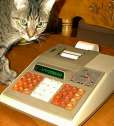| Datasheet legend
Ab/c: Fractions calculation
AC: Alternating current BaseN: Number base calculations Card: Magnetic card storage Cmem: Continuous memory Cond: Conditional execution Const: Scientific constants Cplx: Complex number arithmetic DC: Direct current Eqlib: Equation library Exp: Exponential/logarithmic functions Fin: Financial functions Grph: Graphing capability Hyp: Hyperbolic functions Ind: Indirect addressing Intg: Numerical integration Jump: Unconditional jump (GOTO) Lbl: Program labels LCD: Liquid Crystal Display LED: Light-Emitting Diode Li-ion: Lithium-ion rechargeable battery Lreg: Linear regression (2-variable statistics) mA: Milliamperes of current Mtrx: Matrix support NiCd: Nickel-Cadmium rechargeable battery NiMH: Nickel-metal-hydrite rechargeable battery Prnt: Printer RTC: Real-time clock Sdev: Standard deviation (1-variable statistics) Solv: Equation solver Subr: Subroutine call capability Symb: Symbolic computing Tape: Magnetic tape storage Trig: Trigonometric functions Units: Unit conversions VAC: Volts AC VDC: Volts DC |
|
||||||||||||||||||||||||||||||||||||||||||||||||||||||||
*memory backup only
 Here's a desktop calculator that would not normally belong to my collection but it is too unusual to be left out. The APF 231 looks like your standard old-style heavy-duty electronic business calculator, until you look closer and realize that it's a little bit more than that; it is actually a programmable old-style heavy-duty electronic business calculator!
Here's a desktop calculator that would not normally belong to my collection but it is too unusual to be left out. The APF 231 looks like your standard old-style heavy-duty electronic business calculator, until you look closer and realize that it's a little bit more than that; it is actually a programmable old-style heavy-duty electronic business calculator!
Programming, in this case, means recording up to 9 keyboard macros, to a combined length of up to 256 keystrokes. That's a fair bit of storage but in the absence of program editing functions, conditional or unconditional branching, or the ability to call programs as subprograms from within another program, the machine's program capability is more limited than it should be. On the plus side, program memory is protected by an internal NiCd battery.
No exponential functions, no logarithms, and no subprogram capability means it is unlikely that I'll ever be able to implement my favorite example on this machine, the Gamma function. But that doesn't mean that sophisticated algorithms cannot be keyed in on this machine as long as you have the patience to do it. Case in question: the program below actually calculates the sine of any angle (expressed in radians) using a polynomial approximation. There you go, trigonometric functions on a programmable four-banger!
Switch Settings
Float
Day OFF
Fn OFF
5/4
SIGMA ON
IC OFF
NP
000 LB
001 M+=
002 +
003 ×
004 =
005 =
006 ÷
007 K
008 2
009 ÷
010 K
011 3
012 =
013 MII
014 M+=
015 -
016 MR
017 ×
018 MII
019 MC
020 =
021 =
022 ÷
023 K
024 4
025 ÷
026 K
027 5
028 =
029 MII
020 M+=
031 +
032 MR
033 ×
034 MII
035 MC
036 =
037 =
038 ÷
039 K
040 6
041 ÷
042 K
043 7
044 =
045 MII
046 M+=
047 -
048 MR
049 ×
050 MII
051 MC
052 =
053 =
054 ÷
055 K
056 8
057 ÷
058 K
059 9
060 =
061 MII
062 M+=
063 +
064 MR
065 ×
066 MII
067 MC
068 =
069 =
070 ÷
071 K
072 1
073 0
074 ÷
075 K
076 1
077 1
078 =
079 MII
080 M+=
081 -
082 MR
083 ×
084 MII
085 MC
086 =
087 =
088 ÷
089 K
090 1
091 2
092 ÷
093 K
094 1
095 3
096 =
097 MII
098 M+=
099 +
100 MR
101 ×
102 MII
103 MC
104 =
105 =
106 ÷
107 K
108 1
109 4
110 ÷
111 K
112 1
113 5
114 =
115 MII
116 M+=
117 -
118 MC
119 ×
120 MII
121 MC
122 =
123 =
124 ÷
125 K
126 1
127 6
128 ÷
129 K
130 1
131 7
132 =
133 +
134 T
135 LB


